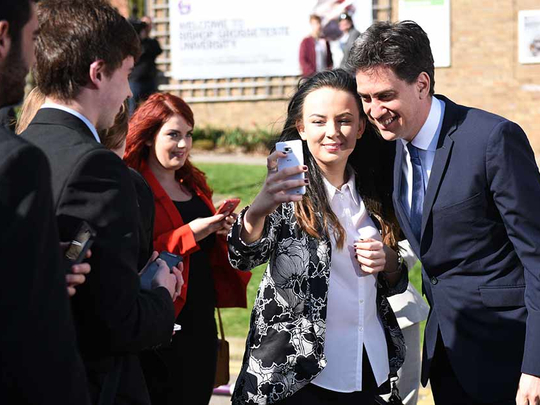
London: Lampooned by detractors as a socially awkward geek, British Labour Party leader Ed Miliband has received a pre-election boost from an unlikely source — hundreds of young, mostly female, Britons who have declared their love for him on Twitter.
In less than 24 hours, more than 20,000 posts have appeared under the hashtag #Milifandom — a name referencing other ‘fandoms’, or online gatherings of dedicated fans, more often aimed at pop stars and celebrities.
Miliband, 45, is challenging to become prime minister in an election on May 7 and polls have Labour and the ruling Conservatives running neck-and-neck.
The Twitter trend flies in the face of how he is treated by Britain’s right-wing press. In the run-up to the election, newspapers have published unflattering images of him and mocked his efforts at engaging with the public.
The “Milifandom posts range from those of stock photos of Miliband alongside descriptions such as “adorable and lovely” to
images of his face superimposed onto the bodies of more conventional sex-symbols like James Bond film actor Daniel Craig.
“It’s young people who support the policies of Labour ... who are angry that Ed Miliband is distorted so often in the media,” said a Twitter user posting under the handle ‘Abby’, who was credited with starting the craze in an article by BuzzFeed.
The trend comes alongside a modest revival in Miliband’s personal ratings, which are lower than those of Conservative Prime Minister David Cameron but have risen since January despite a Conservative election campaign designed to portray him as a weak and inadequate leader.
“In a general election campaign where Ed Miliband can become a sex symbol, absolutely anything can happen,” said bookmaker Paddy Power, which this week made Miliband favourite to become Britain’s next prime minister for the first time since October.
The electoral advantage of the online trend remains unclear, with many of those behind it likely to be too young to vote.
Even so, Miliband engaged with his young fan, sending a public reply to ‘Abby’: “Hi Abby — Delighted that you’ve joined Labour, welcome”.
There was no indication that Labour might have been involved in instigating the trend.












